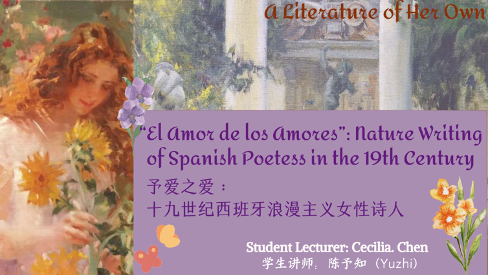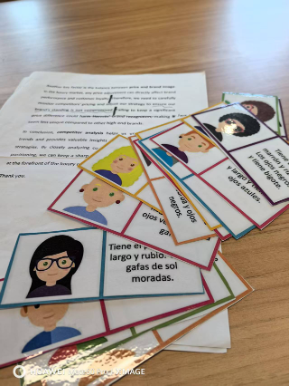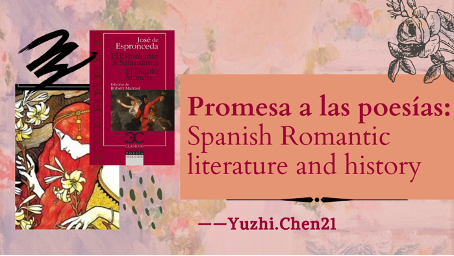14 Mar 2025
To provide XJTLU students with more opportunities to delve deeper into their fields of interest, the university launched the Extended Study Scheme (ESS) in 2022. Students who complete 20 credits through the programme receive an ESS certificate, recognizing their sustained efforts over four semesters. Chen Yuzhi, a Stage 4 student in English Studies, and Wang Tianjiao, a Stage 3 student in Marketing, are set to receive certificates in Spanish Language. Let’s hear their stories!
Q1: Why did you choose a second foreign language for your ESS modules?
Yuzhi: I fell in love with Spanish the moment I started learning it in my freshman year. I had previously encountered Spanish culture through films and books like the historical drama Isabel about the Catholic Monarchs, the contemporary novel The Time in Between (El Tiempo entre Costuras), and the Golden Age classic Don Quixote (Don Quijote). Learning Spanish felt like connecting the past dots. Initially, I thought all students could study a second language for four years, but later realized only International Business with a Language had that option. When ESS opened up to all students, I was thrilled!
Tianjiao: As a Marketing major, I believe learning a new language enhances communication skills and deepens cross-cultural understanding, which is crucial for expanding markets. When ESS was announced via email and eBridge, I immediately signed up. I’ve always enjoyed learning English, and studying Spanish revealed fascinating connections between Romance languages—like how Spanish, English, and Italian share roots. It’s a delightful process of discovery!
Q2: How has language learning enriched your university experience?
Yuzhi: As a Literature student, knowing another language allows me to engage deeply with European and global works. Reading Spanish poetry and recognizing vocabulary I’ve learned feels magical. Spanish, like English, has roots that reveal patterns, making memorization fun. My "History of English" module also overlaps with Spanish linguistic evolution, creating a mutually enriching loop.
I’m also passionate about British Romantic poetry. For a Spanish literature project, I explored female poets of Spain’s Romantic era, which later deepened my understanding of parallel British works. In a Modernist Literature course, we studied W.H. Auden’s poems about the Spanish Civil War. My Spanish classes, coupled with films recommended by professors, added immersive context. Last year, I even taught a session on Spanish women’s literature as a student instructor—an unforgettable experience!

Tianjiao: Language classes thrive on interaction. Face-to-face exchanges with teachers and peers sharpen expression and cultural insight—something self-study can’t replicate. Spanish also reshaped my thinking. For instance, Spanish speakers express emotions more directly. We discussed phrases like cena romántica (romantic dinner) or tatuaje por amor (tattoo for love), which feel bold compared to Chinese norms. It’s a window into how others live and communicate. Even simple greetings like "Have you eaten?" (common in China) surprise expats—these moments spark growth.

Q3: Any memorable moments from your language journey?
Yuzhi: My Spanish teacher is deeply interested in the Spanish Civil War, a topic I connect with due to my fascination with China’s 20th-century intellectual struggles. For an oral exam, I analyzed a film set during that era. During Spanish Culture Week, a guest lecture compared modern Chinese and Spanish history, linking poets like Dai Wangshu and Federico García Lorca. It was moving and enlightening!
Another funny moment: While preparing for finals in the Foundation Building, I overheard Italian students nervously practicing for their Chinese exams. It felt surreal—students worldwide striving to understand each other through language.

Tianjiao: Language breaks stereotypes. Before, I associated Spanish cuisine with paella. Now, I’ve learned about dishes like Colombia’s Bandeja Paisa or Cuba’s plátano maduro—all through authentic Spanish terms, not English translations.
This semester’s podcast-style oral exam was a highlight. We imagined advising Spanish-speaking expats in China on cultural integration. My group introduced author Yu Hua, blending creativity with language practice. The relaxed, immersive setup made it stress-free and fun!

Q4: How do you balance your major and ESS studies?
Yuzhi: Spanish is my escape! British literature can get melancholic, so switching to lively Spanish classes refreshes me. Assessments are flexible—like presenting on Pan’s Labyrinth (El Laberinto del Fauno) for a recent oral exam. Even tricky verb tenses turned into enjoyable challenges.
Tianjiao: ESS’s 5-credit workload feels manageable. Teachers provide ample support and resources, like extra listening exercises for higher-level courses. Balancing both is doable with good time management.
14 Mar 2025








